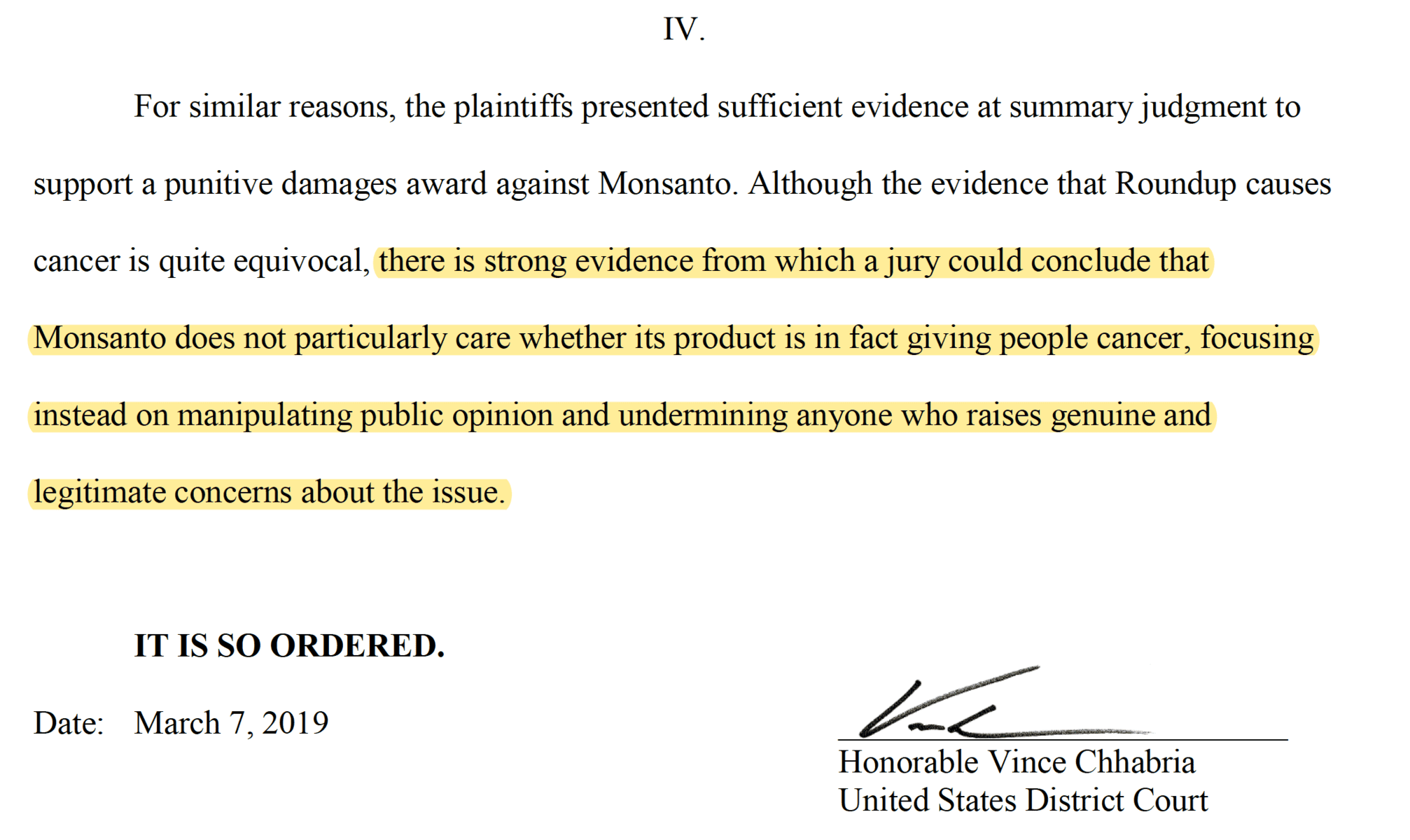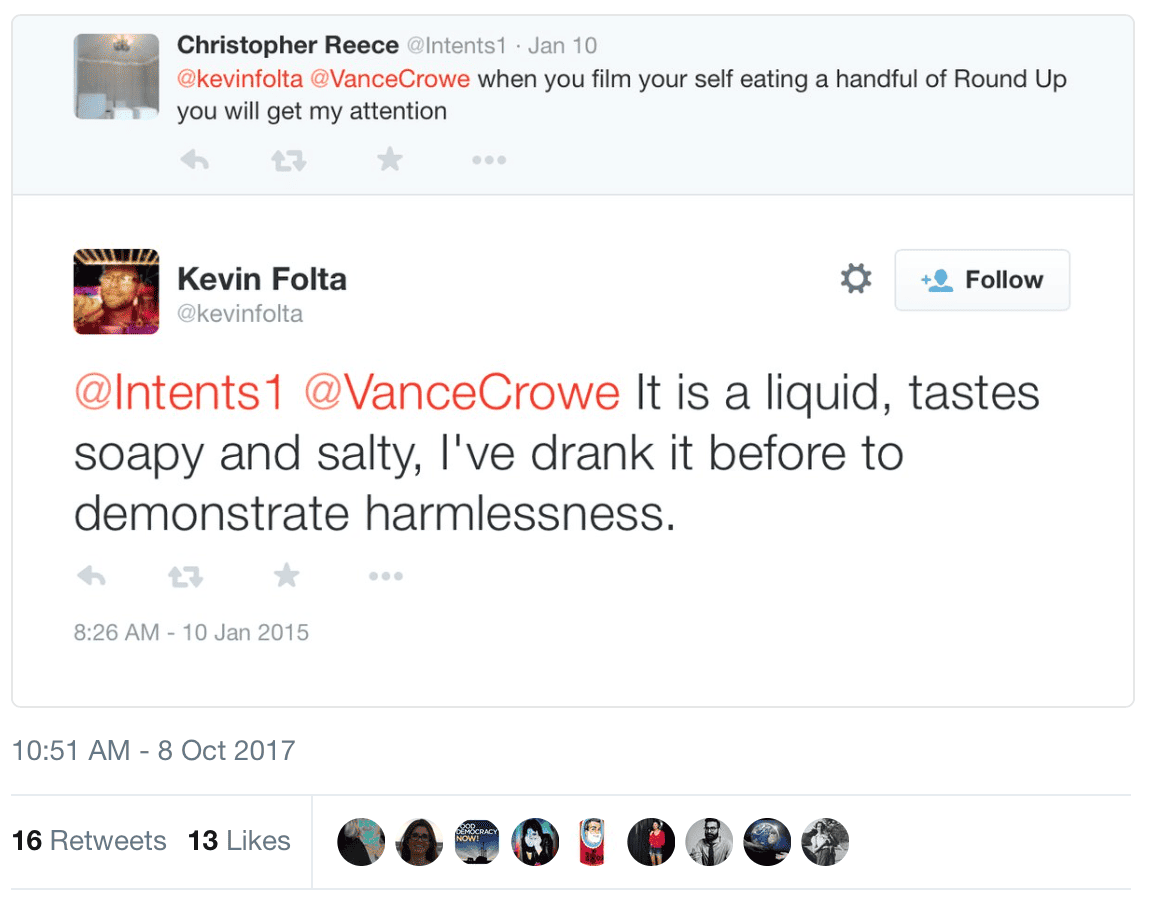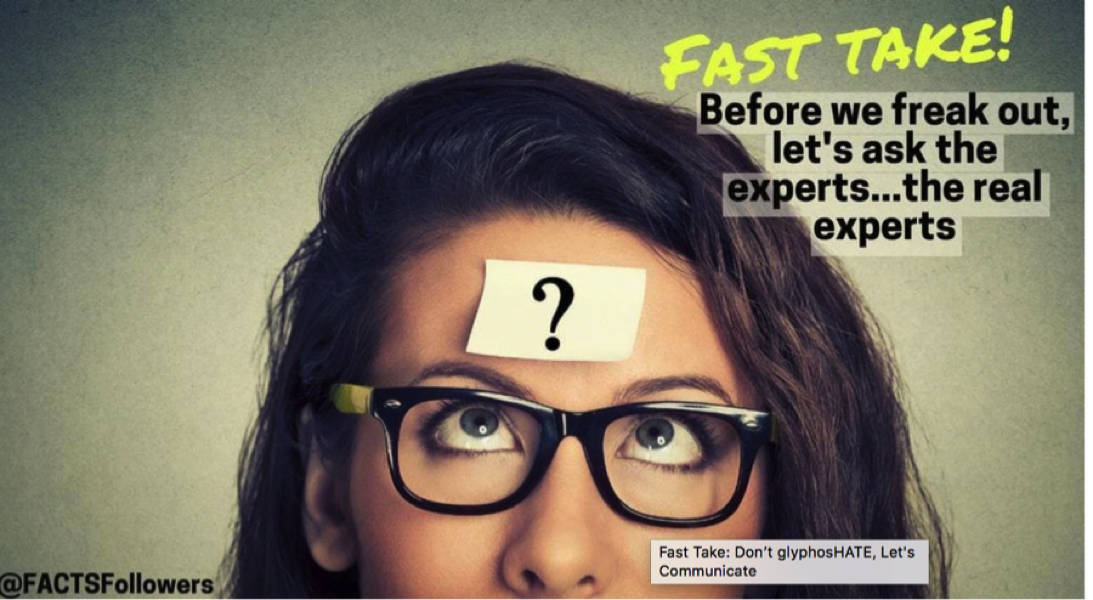Amid global debate over the safety of glyphosate-based herbicides such as Monsanto’s Roundup, numerous claims have been made to defend the product’s safety. In the wake of two recent landmark jury rulings that found Roundup to be a substantial factor in causing non-Hodgkin lymphoma, we examined some of these claims and fact-checked them for accuracy.
If you have more examples of glyphosate spin you’d like us to fact check, please email them to stacy@usrtk.org or tweet to us @USRighttoKnow .
Mark Lynas, Cornell Alliance for Science
Cornell Alliance for Science website (Nov. 2017)
This article by Mark Lynas of the Gates Foundation-funded Alliance for Science (formerly called Cornell Alliance for Science) contains several inaccurate and misleading statements. Like many promoting glyphosate products, the claims here focus on trying to discredit the International Agency for Research on Cancer (IARC), which classified glyphosate as a probable human carcinogen in 2015.
CLAIM: IARC is a “little known and rather flaky offshoot of the World Health Organization” that “finds almost everything carcinogenic.”
FACT: IARC is the specialized cancer research agency of WHO with expert panels comprised of independent scientists from various disciplines of cancer research. In its 50-year history, IARC has assessed 1,013 substances and found 49% of those were “not classifiable as to its carcinogenicity to humans”; 20% were classified as known or probably carcinogenic to humans.
CLAIM: “early drafts of the IARC assessment were extensively altered at a late stage to point towards a carcinogenicity finding – even when the science they were assessing pointed away from this”
FACT: This claim is sourced with a flawed Reuters report by Kate Kelland that left out crucial facts , including the fact that most of the information IARC didn’t adopt from “early drafts” was from a review article co-authored by a Monsanto scientist. The review article “did not provide adequate information for independent evaluation of the conclusions reached by the Monsanto scientist and other authors,” IARC said. Kelland has written a number of stories critical of IARC; documents released in 2019 establish that Monsanto secretly had a hand in some of her reporting.
Lynas used one other source to buttress his claims about wrongdoing at IARC: David Zaruk, a former chemical industry lobbyist who once worked for the public relations firm Burson-Marsteller.
CLAIM: Glyphosate is the “most benign chemical in world farming”
FACT: This statement is not science-based. Studies link glyphosate to a range of health concerns including cancer, endocrine disruption, liver disease, shortened pregnancies, birth defects and damage to beneficial gut bacteria. Environmental concerns include negative impacts on soil, bees and butterflies.
SOURCE: Mark Lynas is a former journalist turned promotional advocate for agrichemical products. He works for the Alliance for Science, a PR campaign housed at Cornell University that is funded by the Bill & Melinda Gates Foundation to promote and defend GMOs and pesticides.
American Council on Science and Health
ACSH website (October 2017)
CLAIM: The IARC carcinogenicity report on glyphosate was a case of “scientific fraud”
FACT: ACSH based its “fraud” claims on the same two sources Mark Lynas of the Alliance for Science used to attack IARC on the Cornell website: the former chemical industry lobbyist David Zaruk and the inaccurate Reuters article that was framed around talking points a Monsanto executive gave the reporter.
SOURCE: The American Council on Science and Health is a front group that receives funding from chemical, pharmaceutical and tobacco companies, and pitches its services to industry groups for product defense campaigns, according to leaked internal documents. Emails from 2015 establish that Monsanto was funding ACSH and asked the group to write about the IARC glyphosate report. An ACSH staffer responded that they were already involved in a “full-court press re: IARC” regarding agrichemicals, phthalates and diesel exhaust.
Yvette d’Entremont, a.k.a. the “Sci Babe”
Self Magazine article (October 2018)
CLAIMS: “with over 800 studies on it, no study has shown the components in Roundup to cause cancer” … “there haven’t been major credible studies showing a causal link between Roundup and cancer.”
FACT: Several major credible studies link Roundup or its key component glyphosate to cancer, including a study submitted to the EPA in the 1980s that EPA scientists at the time said was evidence of cancer concerns. There are too many studies to list, but citations can be found in the 2015 IARC Cancer Monograph on Glyphosate.
Additionally, a broad scientific analysis of the cancer-causing potential of glyphosate herbicides published in February 2019 found that people with high exposures had an increased risk of developing a type of cancer called non-Hodgkin lymphoma.
SOURCE: Yvette d’Entremont is a “contributing editor” to Self Magazine with a column called “SciBabe Explains.” Self Magazine does not disclose to its readers that SciBabe partners with companies whose products she defends. In 2017, the artificial sweetener company Splenda partnered with SciBabe to help “empower fans of the SPLENDA® Brand to take an active role in busting myths about sucralose.” Some of her speaking engagements at farming conferences have been sponsored by pesticide companies.

Geoffrey Kabat, epidemiologist
Genetic Literacy Project website (October 2018)
CLAIM: Glyphosate “has been so thoroughly studied for toxicity and the concentrations found in humans are so low that there is no need for further study … there is really nothing left to justify further research!”
FACT: In sworn testimony admitted into evidence in ongoing litigation against Monsanto and its owner Bayer AG, former Monsanto CEO Hugh Grant acknowledged the company never did any epidemiology study of glyphosate-based herbicide formulations the company sells. The company also sought to block a toxicity evaluation of glyphosate formulations by the Agency for Toxic Substances and Disease Registry.
Moreover, these comments, which Dr. Kabat attributed to an anonymous source, ignore two key facts: independent studies link glyphosate to a wide range of health problems and environmental concerns, and evidence from court filings suggests that Monsanto interfered with scientific and regulatory assessments of glyphosate (see examples and sources here, here, here, and here).
According to Judge Vince Chhabria, who presided over a recent federal trial that resulted in $80 million in damages against Monsanto, “the plaintiffs have presented a great deal of evidence that Monsanto has not taken a responsible, objective approach to the safety of its product.” The judge also wrote:

Regarding pesticide residues in people, recent science is raising concerns that current regulations do not provide adequate health protections. See reporting by Carey Gillam, Chemicals on our food: When ‘safe’ may not really be safe, and commentaries by scientists here, here and here.
SOURCE: Dr. Geoffrey Kabat has longstanding ties to the tobacco industry and has published papers favorable to the tobacco industry that were funded by the tobacco industry. He serves on the board of directors of the parent organization of Genetic Literacy Project, which works with Monsanto on PR projects. Kabat is also on the advisory board of the front group American Council on Science and Health.
Patrick Moore, PR consultant
Video interview with Canal+ (March 2015)
CLAIM: “You can drink a whole quart of [glyphosate] and it won’t hurt you.”
FACT: Even Monsanto says you should not drink glyphosate. According to the company’s website, “glyphosate isn’t a beverage and should not be ingested – just like you wouldn’t drink shampoo or dish detergent. It is always important to use products for their intended purpose and as directed on the label.” (The post also clarifies that Moore “isn’t a Monsanto lobbyist or employee.”)
SOURCE: Moore has been portrayed as a co-founder of Greenpeace who “calls out his former group” as he argues for deregulation of toxic products or polluting industries. According to Greenpeace, “Once upon a time, Dr. Patrick Moore was an early Greenpeace member. Now he is a public relations consultant for the polluting companies that Greenpeace works to change.” In 2014, Moore testified to a U.S. Senate committee that there is no scientific evidence that human activity is causing global warming.
Kevin Folta, PhD, professor at the University of Florida

CLAIM: “I’ve drank [glyphosate] before to demonstrate harmlessness” … “I’ve done it live and will do it again. Must be mixed w/coke or c-berry juice. Tastes soapy. No buzz”
FACT: While Dr. Folta may indeed have consumed glyphosate, this is bad advice coming from an unreliable source. As described above, even Monsanto says you should not drink glyphosate.
SOURCE: Professor Folta has misled the public on many occasions about his agrichemial industry ties. In 2017, Dr. Folta sued the New York Times and Pulitzer-Prize winning journalist Eric Lipton for reporting on Folta’s undisclosed collaborations with Monsanto to help defeat GMO labeling. The lawsuit was dismissed.
Alison van Eenennaam, PhD, animal geneticist, UC Davis
Video interview, Real News Network (May 2015)
CLAIM: “I think there’s several very comprehensive meta-analyses that have been done recently that show there are no unique toxicological or carcinogenicity effects associated with the use of Roundup. There was the German Federal Institute for Risk Assessment that just reviewed hundreds of toxicological studies and nearly a thousand published reports, and concluded that the data showed neither carcinogenic or mutagentic properties of glyphosate, nor that glyphosate is toxic to fertility, reproduction, and or embryonic fetal development in lab animals … And I wouldn’t call Germany necessarily a country where you would expect them to be doing a risk assessment that wasn’t really looking at what the data’s saying.”
FACT: A 2019 report commissioned by Members of Parliament in the European Union found that Germany’s risk assessment agency “copy-and-pasted tracts from Monsanto studies.” See reporting in the Guardian by Arthur Neslen, “EU glyphosate approval was based on plagiarised Monsanto text, report finds. ”
SOURCE: Dr. van Eenennaam is a leading promoter of genetically engineered animals and crops, and a fervent advocate for deregulation. Documents show she has coordinated with agrichemical companies and their public relations firms on PR and messaging.
Food Evolution documentary film
This 2017 feature-length documentary promotes genetically engineered foods as the solution to world hunger but glosses over a key controversy at the center of the GMO debate: whether Roundup, the herbicide that most GM crops are engineered to resist, causes cancer. The film does not even mention the IARC report that found glyphosate to be a probable human carcinogen, and it relies on just two sources to claim that glyphosate is not a worry.
CLAIM: The film shows footage of Monsanto’s Robb Fraley giving a speech; when an audience member asked him about studies linking glyphosate to cancer or birth defects, Fraley waved his hand dismissively and said all those studies are “pseudoscience.”
FACT: Evidence from animal studies and epidemiological data published in reputable journals link glyphosate to several adverse impacts including cancer and birth defects.
CLAIM: A farmer claims that glyphosate has “very, very low toxicity; lower than coffee, lower than salt.”
FACT: Comparing the toxicity of short-term exposure of glyphosate to things like coffee or salt is irrelevant and misleading; concerns about links to cancer are based on chronic, long-term exposures to glyphosate.
SOURCE: Food Evolution was produced by Scott Hamilton Kennedy, narrated by Neil deGrasse Tyson and funded by the Institute for Food Technologists, an industry trade group. Dozens of academics have called it a propaganda film, and several people interviewed for the film described a sneaky and deceptive filming process. NYU Professor Marion Nestle asked to be taken out of the film, but the director refused.
Independent Women’s Forum
IWF website (August 2018)
CLAIM: “The truth is, glyphosate is not carcinogenic.”
FACT: This article by Julie Gunlock provides no scientific backing for its claims; the only links lead to previous IWF blogs accusing environmental groups of lying and “unnecessarily scaring moms.”
SOURCE: The Independent Women’s Forum promotes tobacco products, denies climate science and partners with Monsanto on events to defend pesticides. IWF is funded largely by right-wing foundations that promote deregulation for polluting industries.
The International Food Information Council
IFIC website (January 2016)
CLAIM: “IARC’s determination [that glyphosate is a probable human carcinogen] was found by numerous experts to have excluded dozens of studies that found no evidence of glyphosate being carcinogenic. Experts also found IARC’s review to be based on flawed and discredited science, some even going so far as to say the conclusion was ‘totally wrong.'”
FACT: IFIC relied on industry sources for these claims, linking to articles by Val Giddings, PhD, former trade group executive turned PR consultant for the agrichemical industry; and Keith Solomon, a toxicologist who was hired by Monsanto to assess the IARC report.
SOURCE: The International Food Information Council, funded by large food and chemical companies, promotes and defends sugar, artificial sweeteners, food additives, pesticides, processed foods and GMOs. A Monsanto PR plan identified IFIC as one of the “industry partners” that could help defend glyphosate from cancer concerns.

This photo was posted to IFIC’s glyphosate page, and deleted after we called attention to it. It is an example of the type of patronizing messaging the food industry uses to try to persuade women to trust them.









